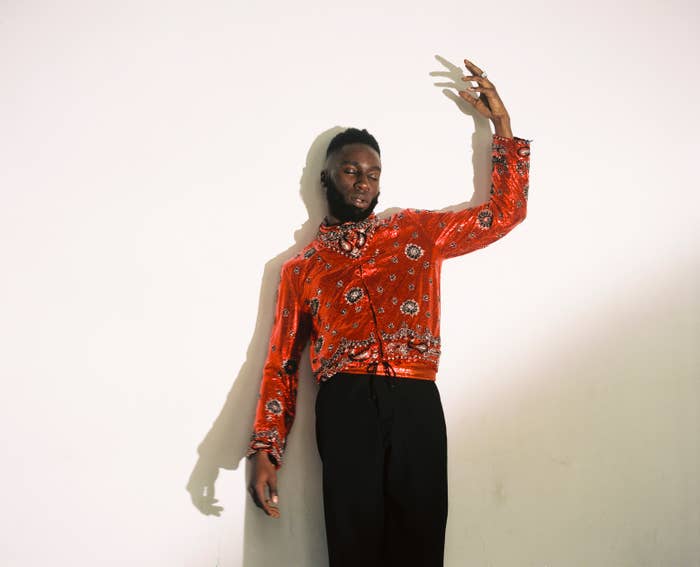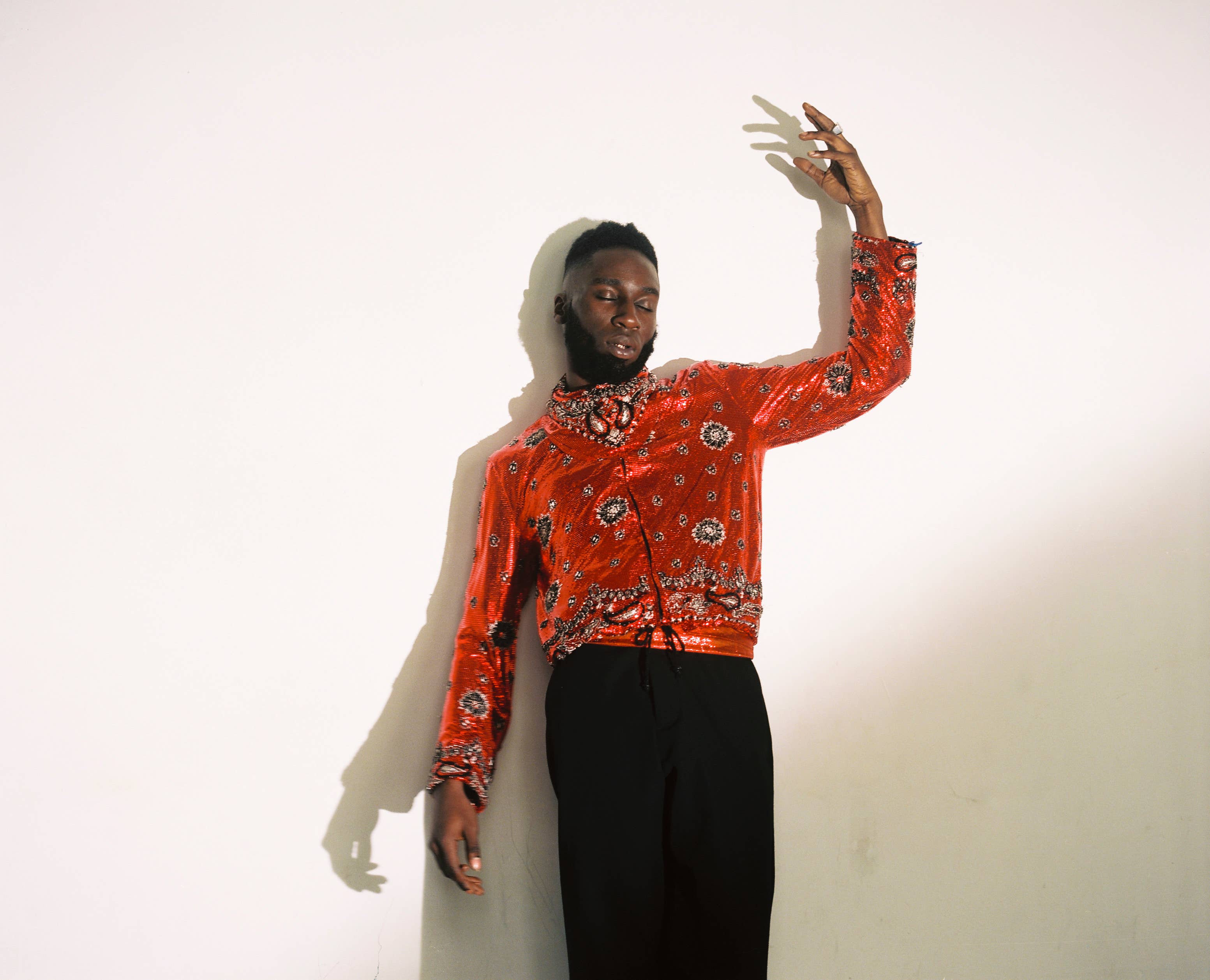
Gracing these pages in many guises over the years, Kojey Radical’s initial titles ranged from model and visual artist to spoken word poet, and then: MOBO-nominated rapper, solidified by breakout release23 Winters and his equally impressive follow-up In God’s Body.
Cashmere Tears, Kojey Radical’s latest project, is a glorious celebration of overcoming challenges—both inner and outer—and is the East London native’s biggest and most ambitious set so far. Described to me as “taking the wins and matching them up with the losses”, the concept of crying in cashmere is broken down as we speak on the eve of its release. “23 Winters, that’s full kente but it’s a kente suit—it’s like a mix within the diaspora,” says Kojey, as I ask him to reimagine his works as fashion pieces.
Impeccably dressed whenever we cross paths, he goes on: “In God’s Body is like a heavy wool jacket, or a peacoat down to the ankles with a heavy Jill Sander boot.” As he reels off precise references, it’s this clear straddling of music, fashion, art and creativity that ignites a mind like Kojey’s on a slow, dull afternoon like today. Cashmere Tears brings a pause. “I would say it’s silk, or cashmere... actually, it’s deeperthan fabric: it’s what the room smells like.”
I sense a new level of freeness when I catch up with the rapper.
COMPLEX: When did you start work on Cashmere Tears?
Kojey Radical: All the recording was done in February 2019, but it took about two years to prepare myself mentally and emotionally to a stage where I could make a project.
Looking at the visuals, I’d say this ‘era’ was sort of kicked off when you released “Water” with Swindle and Mahalia.
Yeah, I’d agree.
And all the videos released after, they felt connected in a way but I couldn’t quite figure it out.
I just let my life play out in the music—I can’t predict it. So I’d say the reason it might sound cohesive or connected is because it’s never really been forced. Not trying to look a certain way or achieve a certain effect, I’ve just poured myself out into whatever I’ve been working on and led with it. So it just feels like you’re growing with me; nothing feels out of place.
The actor Michaela Coel continued her role from your last project with a spoken-word intro piece for “Water”. She kinda connected both of the projects for me.
Well, that single came just after In God’s Body, but we didn’t do a lot of visuals for it and we still had this really amazing interlude from the project called “Superhuman”. I had written that poem but I felt it sounded way better read by a woman. Michaela took it to a different dimension and added a new perspective that I wouldn’t have been able to, reading it myself.
She had a line about “black bodies” and “dancing”, and for the “Can’t Go Back” visuals, you’re full-on dancing—that’s why I thought I’d caught something.
You have! It’s the reason why I emphasize in my music, “keep dancing, keep dancing”. When I was going through my mental health issues—depression or whatever—I used dance as therapy. What I would do is put music on and I would dance until I physically got tired, and then rest. I’ve always linked this idea of dancing with this feeling of mediation, in some ways.
That connection with what’s inside of you.
Yeah, literally! You can’t predict your next move.
When I was going through my mental health issues—depression or whatever—I used dance as therapy.
I was unsure about that: whether you were channeling your own energy, or energy from another source.
Nah, that’s my energy! Everything in the past at least, I feel has given a picture of who I am, so there’s a bit of distance between me as a person and me as an artist. On this project, I wanted to include much more personal feelings and a more personal story to the visuals, and the way that things tie together. A lot of the details and the connection points, they’re like inside things—things I don’t expect the world to just get immediately. I wanted to make it rewarding for the actual listener.
I noticed a tribute to Harry Uzoka, a close friend of yours, at the beginning of “Can’t Go Back”. I know how much his passing affected you—how do you work on expressing that?
I’ve always found it difficult to write, like, a tribute song for Harry, but I feel like the memory of Harry in my music will never die. Since he’s gone, I’ve never actually thought that he’d left—his presence has always kinda been there. Going into this, in the back of my mind, I knew I wanted to make a project that he’d love. With Harry, it was like every day of the week was a Sunday to him, but on a Sunday vibe, he’d be out in his robe dancing around the house. Anything from Sade to J Dilla—he’d be in his bag!
We spoke a while back on the differing points of introduction people have to your music—do you feel like you’ve now gone past that point?
Yes and no. In some spaces, yeah... I enjoy convos like this because I can’t skip that part. Some may have heard of me a while ago and, for whatever reason, they just didn’t bite? They just waited, waited to see if it was a passing name in the wind, and by the time they realise I’m here forever, it’s like: “Oh no! I have to go back.” So they might feel like they’ve just discovered me; a few songs deep but I’m three projects in, multiple collaborations, multiple tours, there’s film stuff and fashion, but you don’t want people to be overwhelmed. Sometimes I prefer the quick introduction. In a time when so many struggle for longevity, I can’t really complain.
Tell us a story about the process in making this project.
On my track “2020”, I say, “I just came back from the Motherland, the view was beautiful”, from when I spent time in Ghana just before I started. I was listening to the new wave of African artists, the new ‘Alte’ movement, and this one girl stood out to me and that was Amaarae. So we’re at the studio in Accra, and you know when someone’s energy just explodes? She jumped out this big Jeep, shaved head, colour dye, swaggy. Everyone knows who she is. They say to me: “This is Amaarae, your cousin.” [Laughs] I took a step back, I saw the way she moved and I said, “Yeah, she is my cousin!” I told her, “Ama, I’m going to Henley on Thames to create this project and I want you to come from lovely, sunny Ghana to come be with us by the lake.” She became one of the most pivotal pieces in making this flow the way it flows. It could have gone unnoticed and under-appreciated, but Amaarae is the reason it all flows—everyone will tell you that. From the producers to the instrument guys, everyone would ask: “Ama, what do you think of this?” She just loves music! We made “Sugar” within the first 45 minutes of being at the camp.
That’s crazy. Who else was at the camp?
We had Swindle and KZ, Hugh, Maverick Sabre came down, my boys Ejiro and Craig, the horns, the violins. Any string arrangement on the project was performed and composed live. Reason why I picked the group I did, KC had produced everything for me, from “Dear Daisy” through to “If Only”; Hugh on “97” and “Pure”; and Swindle had obviously worked on “Water”. So I thought let’s just get together and create the Megazord! It’s all good and well being individual Power Rangers, but sometimes we need to form the Megazord!
London Fashion Week kicks off the day your project drops. You usually come alive across that week—anything special planned this year?
I’m touring! This project is so important to me, and I know I’m the person that does everything, but I wanna do music. I want people to know and hear that I love the music right now. For me, that’s the marathon; in the memory of Nipsey and Harry, people that brought me that message. Things don’t happen overnight—well, they can, but they won’t last. I’ve gotta be prepared for the long race. As soon as the project lands, I’ll be in Manchester, then to Glasgow through to Bristol. I’ll be joining Kano’s tour as well, at some point. I personally feel I can make it run until about March, then I want another big show just to celebrate what we’ve done with the project. Full choir, full orchestra—everything.
On the mention of Nipsey, what impact did his career and message have on you?
I won’t sit down and pretend I listened to every single Nipsey song, because I didn’t, but I watched every interview. The wisdom he was kicking, when it comes from someone that’s older but still close in age, you realise age is just a metric for measuring how long you’ve been on the planet. The wisdom comes from somewhere else. It’s the same for young artists that come to me and tell me they’re struggling with this or with that, or they’ll say: “This is hard!” I ask, “Do you want to do this forever?” and their reply will always be “yes.” Well then, however long it takes is how long it takes. If you rush to the end goal—done! The climb is really where the story is told and it’s where the journey is appreciated.
When did that sink in for you with the change of mindset?
I had a list. I had two lists, actually. One was everything I wanted; quick goals, not superficial but achievable goals. And the other was for everything that meant my life was sustained or comfortable, and those boxes were all ticked. I make money, I work when I want to, I don’t really have to follow a rulebook but it was the other things getting me down. Silly things like… I’ve not had a million views on any of my visuals or won any major awards, despite how respected they are. I can say right now that is silly, but it used to affect my self-esteem so much. Then I realised, wait a minute Koj’—I’m still here! I remember back around 2014 when I really got into music and the crop of artists that were around then, it was amazing! London was full of young artists, ready to blow.
—that Soundcloud generation.
It was crazy! The SoundCloud generation was nuts! And one by one, like dominoes, people fell and fell and fell and for whatever reason, I’m the one that kept on going.
You’re one of the few artists I’ve noticed in recent months pop-up with a private Insta page. What has that done for you?
[Laughs] My lil private Instagram! I was moving crazy at first; basically, I find that people have a very particular perception of who or what they think Kojey Radical is. People that know me know my personality, so now, in dribs and drabs, I’m letting it show on my main page but really I can’t be as silly as I want to be. I think, for my own peace of mind, I just needed some space. People will say social media makes you this or makes you that, but really you choose who you follow.
I’m sure, as time goes by, there’s politics involved for someone like you?
I mean, I don’t pay attention to none of that stuff. I tell everybody I’m a civilian. People see me: on road, chilling, walking to the bakery. I’m not like this invisible figure—I’m a civilian that just makes music. There’s always drama in my life; it’s real life, but I’m not in a fishbowl so you can’t just look at me and watch. That’s why I don’t end up on tabloid pages or blog pages, like ImJustBait and the other street blogs. I’m not saying my ting’s too clean, but I just wanna live a fucking normal life.

